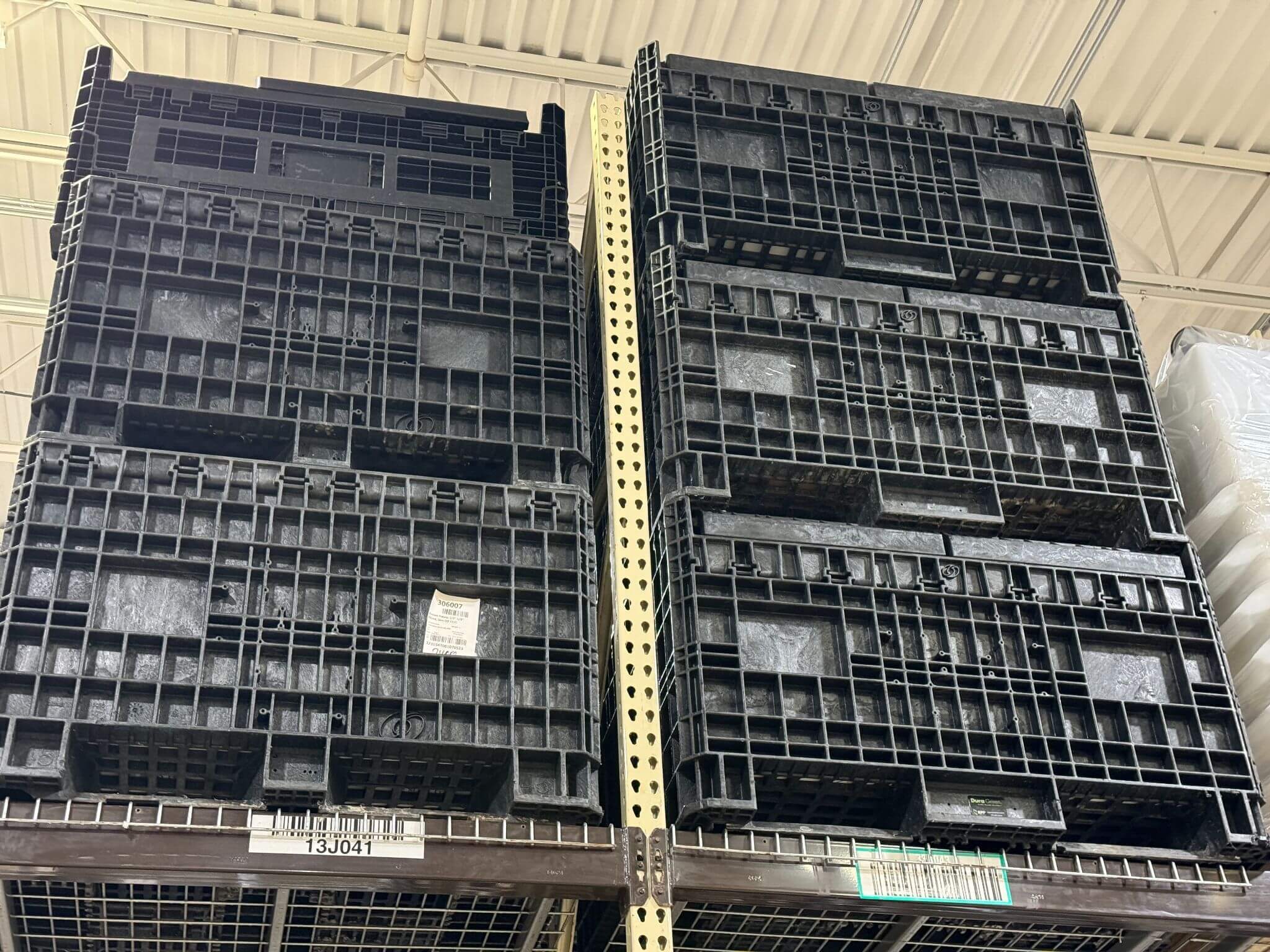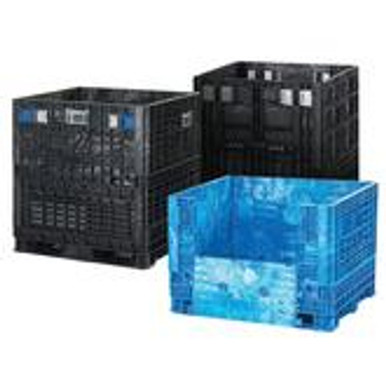The Ultimate Overview to Selecting the Right Bulk Containers for Your Business Requirements
Picking the appropriate mass containers is vital for any kind of organization that counts on effective logistics. Various types of containers exist, each developed for details products and applications. Aspects such as dimension, product compatibility, and governing requirements play a considerable duty in this decision-making process. Recognizing these aspects can cause improved operational efficiency. However, lots of companies forget necessary aspects that can improve their overall effectiveness and sustainability. What are these considerations?
Comprehending Different Kinds of Mass Containers
Bulk containers serve as vital tools for companies seeking efficient storage space and transport options. These containers come in numerous types, each made to meet particular functional needs. One usual kind is the intermediate mass container (IBC), which is perfect for liquid and granulated products, using a balance of capacity and maneuverability. One more prominent option is the bulk bag, or FIBC, appropriate for dry, flowable items. These flexible containers are light-weight and can be conveniently moved and saved. For heavier materials, stiff mass containers are usually utilized, giving toughness and security for safe handling. Furthermore, there are specialized containers tailored for hazardous products, making certain conformity with safety and security regulations. Recognizing the distinctive characteristics of these mass container types allows organizations to make educated decisions that optimize logistics and minimize costs. By selecting the appropriate container, business can enhance their operational effectiveness and enhance their supply chain processes.
Trick Material Considerations for Bulk Containers
When selecting bulk containers, it is important to ponder the materials utilized in their construction. Elements such as strength, chemical, and longevity compatibility play an essential function in making sure the containers fulfill certain operational demands. In addition, weight and portability problems can affect both performance and transportation logistics.
Product Durability and Toughness
Durability and strength are crucial elements in choosing products for bulk containers, as they straight influence the container's capacity to withstand various environmental conditions and taking care of processes. Products such as high-density polyethylene (HDPE), polypropylene, and stainless steel are generally preferred for their robust homes, providing resistance to influence, abrasion, and temperature fluctuations. The option of product likewise influences the overall lifespan of the container; stronger materials typically result in less frequent replacements, leading to cost financial savings over time. In addition, the weight of the material can affect shipping costs and simplicity of handling. Businesses have to consider their specific functional atmospheres and the potential for wear and tear to guarantee peak toughness and stamina in their bulk container choice.
Chemical Compatibility Elements
Comprehending chemical compatibility is important for picking mass containers, as the products made use of have to stand up to the details materials they will certainly hold. Numerous elements influence compatibility, consisting of the chemical nature of the contents, temperature level, and period of storage space. For circumstances, destructive chemicals might call for containers made from stainless-steel or specialized plastics that withstand destruction. In addition, responsive materials can produce warmth or gases, necessitating vented or pressure-rated containers. The selection of container product, whether metal, polycarbonate, or polyethylene, must straighten with the chemical properties of the kept compounds to stop breaches or leaks. Inevitably, a thorough evaluation of these compatibility factors assures risk-free handling and storage, securing both personnel and the environment while preserving item honesty.
Weight and Transportability Problems
Choosing mass containers entails not only assessing chemical compatibility yet likewise taking into consideration weight and portability. Businesses should evaluate the ease of handling and transport to enhance effectiveness. Light-weight products like high-density polyethylene (HDPE) or light weight aluminum can help with simpler movement and minimize shipping prices. Conversely, much heavier containers may provide boosted durability however can hinder wheelchair, specifically in atmospheres calling for constant relocation. Furthermore, the layout of the container must permit practical training and stacking, guaranteeing ergonomic safety and security for employees. Business must also think about the infrastructure readily available for transport; as an example, containers suitable with forklifts or pallet jacks can improve operations. Eventually, the ideal equilibrium in between weight and portability directly influences operational efficiency and expense effectiveness.
Sizing Your Mass Containers for Optimal Efficiency
When sizing bulk containers, services must carefully analyze the dimensions called for to fit their specific products. In addition, weight ability is an important variable that influences efficiency and safety throughout transport and storage space. Reliable sizing not only maximizes space but likewise enhances operational process.
Determining Container Dimensions
Selecting the ideal dimensions for mass containers is vital for making the most of performance in storage space and transport. Companies need to examine their specific requirements, thinking about factors such as offered space, the nature of the items being stored, and the methods of transportation utilized. Precise dimensions ensure that containers fit preferably in stockrooms and automobiles, lessening squandered area and reducing managing time. Standard dimensions can offer benefit, yet customized measurements may be required for distinct requirements or to suit details products. In addition, it is important to review stacking capacities and availability, as these elements affect web total operational effectiveness. Eventually, the right measurements cause improved organization and structured logistics, profiting the overall efficiency of business.
Weight Ability Considerations
Recognizing weight ability is crucial for companies intending to enhance their bulk container efficiency. The weight capability of a container directly impacts storage capabilities, transportation logistics, and general functional prices. Picking containers with the ideal weight restrictions guarantees that services can safely keep and transport their products without risking damages or compliance concerns. Straining containers can result in structural failures, while underutilizing capability lead to lost sources. When picking containers, it is crucial for organizations to analyze their item weights and take into consideration any type of regulative demands. Additionally, aspects such as the kind of product, intended usage, and ecological problems should also influence weight ability choices. By examining these elements, organizations can boost performance and assure a streamlined supply chain.
Governing Compliance and Safety Criteria

Regulative compliance and safety standards play a vital function in the choice of mass containers for services. Organizations should ensure that their containers meet various regulations set by regional, national, and global authorities. These standards typically relate to product safety, structural stability, and appropriate labeling, which aid stop crashes and ensure the secure transportation of goods.
Additionally, adherence to industry-specific guidelines, such as those from the Fda (FDA) or the Occupational Security and Health And Wellness Management (OSHA), is crucial for business handling dangerous materials or foodstuff. Non-compliance can result in penalties, legal concerns, or damages to a business's credibility.
Businesses must likewise take into consideration the container's compatibility with the materials being saved or carried to prevent contamination or chain reaction (used collapsible containers). To summarize, understanding and implementing governing conformity and safety requirements is important for the efficient and accountable usage of mass containers
Sustainability Alternatives for Eco-Friendly Mass Containers

Companies are additionally discovering alternatives made from recycled products, which not just preserve sources yet also support the recycling market. Technologies in layout enable for lighter containers that require less power to transportation, additionally improving sustainability. By incorporating these green mass container choices, businesses can show their commitment to ecological stewardship while satisfying customer need for sustainable practices. This shift not only helps the earth however can also enhance brand name online reputation and client loyalty.
Cost-Effectiveness and Budgeting for Bulk Containers
While lots of organizations concentrate on sustainability, cost-effectiveness stays a critical aspect when picking mass containers. Organizations must analyze the first purchase cost, in addition to long-lasting operational costs, to guarantee financial stability. Elements such as reusability, longevity, and maintenance play a considerable role in determining total expenditures.
Buying top quality containers might yield greater upfront expenses yet can lead to cost savings via minimized substitute rates and lowered waste. In addition, services must take into consideration transportation expenses and storage space performance, as these can affect the overall budget plan.

Regularly Asked Questions
How Do I Figure Out the Right Container for Hazardous Products?
To figure out the right container for unsafe materials, one should assess compatibility with the compound, think about the container's product, look for regulative compliance, and analyze ability and safety and security functions to assure proper handling and storage.
Can Mass Containers Be Customized for Particular Products?
Yes, bulk containers can be tailored for certain items. used collapsible bulk containers. Various functions, such as size, style, and material, can be tailored to meet special needs, making certain suitable safety and security and efficiency for transferring and saving different goods
What Is the Average Life-span of Different Bulk Container Kind?
The average life expectancy of mass container kinds varies; plastic containers last 5-10 years, metal containers 10-20 years, and wooden containers commonly last 3-7 years, relying on use, upkeep, and ecological conditions.
How Should I Tidy and Maintain Mass Containers?
To clean up and maintain bulk containers, one must routinely inspect for damages, eliminate deposit, clean with suitable detergents, rinse completely, and guarantee appropriate drying out before storage. Adhering to manufacturer guidelines boosts longevity and safety during use.
Exist Rental Alternatives for Bulk Containers Available?
Yes, various companies supply rental choices for mass containers, giving adaptability for businesses. weblink These rentals can suit various demands, permitting business to handle stock efficiently without the commitment of buying containers outright.
Toughness and strength are vital factors in choosing products for mass containers, as they directly influence the container's capability to withstand different ecological conditions and dealing with procedures. Understanding chemical compatibility is vital for selecting mass containers, as the products made use of need to stand up to the specific compounds they will hold. Recognizing weight capability is essential for organizations aiming to maximize their bulk container efficiency. Regulatory conformity and safety criteria play a vital function in the choice of bulk containers for businesses. While several organizations focus on sustainability, cost-effectiveness stays an essential aspect when selecting bulk containers.